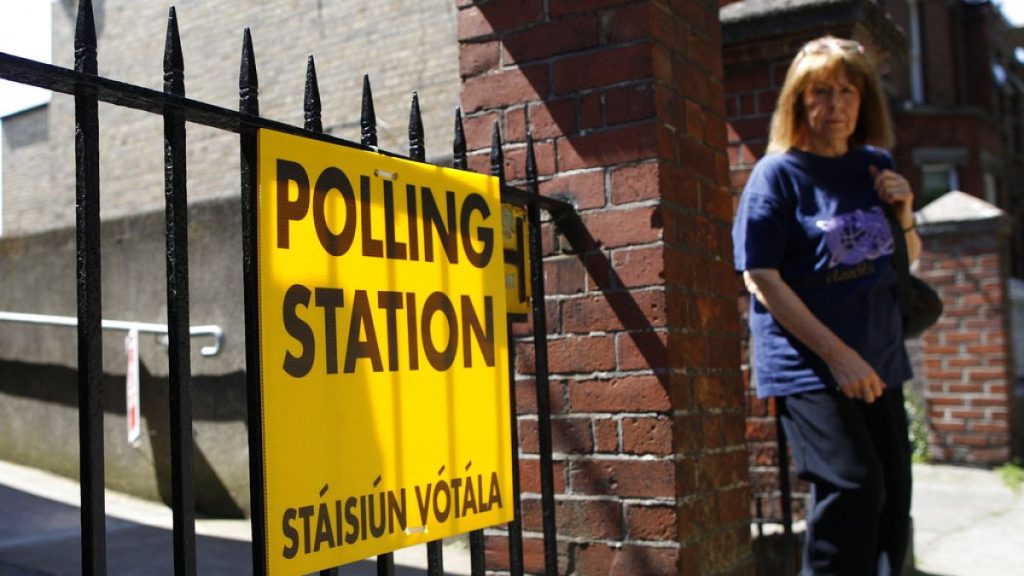Polling has opened in Ireland for the European Parliament elections, with a focus on rising migration and severe housing shortages in the country. The vote comes as a record number of far-right candidates are on the ballot, with fourteen MEPs set to be elected to the EU Parliament. The election campaign has been dominated by controversy surrounding the increasing numbers of asylum seekers and a lack of affordable housing. The ruling coalition of Fianna Fáil, Fine Gael, and the Green Party has taken steps to reduce support for far-right parties by implementing measures such as reducing welfare payments to some Ukrainian refugees and removing migrant encampments. An IPSOS poll with the Irish Times has revealed that almost two-thirds of voters in Ireland want stricter controls on immigration, highlighting a growing frustration with the issue.
Despite the proliferation of candidates on the ballot potentially splitting the far-right vote, voter frustration with migration has affected the prospects of Sinn Féin, Ireland’s main opposition party. Polls have shown that the party’s perceived soft stance on migration has led to a decrease in support, dropping from 33% in 2022 to just 22% last month according to a Sunday Independent/Ireland Thinks opinion poll. Meanwhile, the Netherlands held their elections earlier, with results indicating a far-right surge led by Geert Wilders’ Party for Freedom winning seven seats in the European Parliament. However, a Green-Left alliance managed to secure eight seats, surpassing Wilders’ party. Final results for the entire EU will be announced in Brussels after polls close on Sunday night, reflecting the outcomes of elections across the region.
The issue of migration has become a central theme in the European Parliament elections, with concerns about rising numbers of asylum seekers and housing shortages driving voter sentiment. The ruling coalition in Ireland has attempted to address these concerns by taking measures to reduce support for far-right parties, such as implementing stricter controls on immigration and removing migrant encampments. The results of the elections in Ireland and other countries, such as the Netherlands, are expected to reflect the growing frustration with migration and the impact it has had on domestic issues.
The dominance of far-right candidates on the ballot in Ireland has sparked concerns about potential divisions within the electorate, as the proliferation of choices may lead to a split in support for these parties. Despite this, voter frustration with migration and a lack of affordable housing has impacted the prospects of parties like Sinn Féin, with polls showing a decrease in support due to their perceived stance on these issues. The results of the elections in Ireland and the Netherlands highlight the complex dynamics at play in European politics, with far-right parties gaining ground in some areas while others opt for more progressive alternatives.
As polling continues in Ireland and final results are awaited in Brussels, the outcome of the European Parliament elections will shed light on the shifting political landscape in Europe. With concerns about migration and housing shortages at the forefront of voter sentiment, the results will reflect the impact of these issues on the electoral outcomes. The ruling coalition’s attempts to address these concerns and reduce support for far-right parties will be put to the test, as voters make their choices based on their priorities and values. The final results will provide insight into the direction of European politics and the challenges facing the region in the years to come.
In conclusion, the European Parliament elections in Ireland have been marked by a focus on migration and housing shortages, with a record number of far-right candidates on the ballot. The ruling coalition has taken steps to address voter concerns in these areas, while parties like Sinn Féin have seen a decrease in support due to their perceived stance on migration. The results of the elections in Ireland and the Netherlands will offer insight into the impact of these issues on voter sentiment and the broader political landscape in Europe. As polling continues and final results are announced, the outcomes will provide a snapshot of the challenges and choices facing voters in the region.


